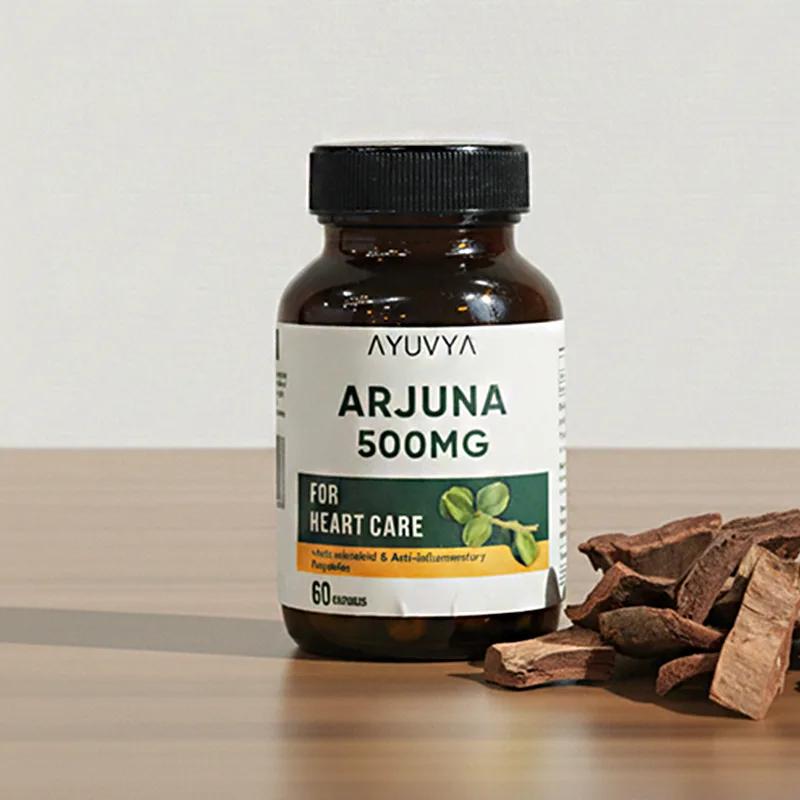Care Of Heart, The Ayurvedic Way
May 09, 2024

In today's fast-paced world filled with stress, hectic lifestyles, and processed diets, our hearts bear the brunt of contemporary living.It's time to pause and think about - what if there was a long-established conventional solution to strengthen our hearts naturally? Today, we uncover the age-old Indian Ayurvedic secret to a stronger heart and explore how centuries-old wisdom can revive our most vital organ - The heart.
Table of Contents:
In today's lifestyle, where maintaining a healthy heart is crucial, there is a growing need to explore natural remedies deeply rooted in ancient wisdom.
Ayurvedic approach to heart health
Ayurvedic approach relies on the balance between the mind, body, and soul. At the core of this approach lies the logic that the heart is not just a physical organ but the center of consciousness and life force energy. By synchronizing the doshas, nourishing the body with heart-supportive foods and herbs, and fostering lifestyle practices that promote balance and strength, Ayurveda offers a roadmap to an ideal heart wellness.
Mind-body practices such as meditation, yoga like gomukhasana, sarvangasana, and forward bend pose further deepens our connection to the heart, cultivating emotional balance and spirit.
Balancing the Doshas
According to Ayurveda, imbalances in the three doshas (Vata, Pitta, and Kapha) can affect heart health. Contrasts in these doshas can disbalance the heart's equilibrium, leading to various cardiovascular issues and compromising well-being. Ayurveda emphasises restoring doshic balance through personalized dietary and lifestyle adjustments, herbal remedies, and mind-body practices to support a healthy heart.
Herbs for a healthy heart
Ayurveda emphasizes the importance of food as medicine, offering dietary guidelines curated to support heart health. Ayurveda is rich in herbs renowned for their heart-friendly properties. Many herbs like Garlic, according to a study, are believed to keep your cholesterol levels in control and prevent hypertension. Another herb is ginger. Ginger is easily available in households and according to research, it can help reduce the risk of hypertension and oxidative stress that may impact our heart by preventing the blocking of arteries to facilitate good blood flow.
Lifestyle Practices for Heart Vitality
In Ayurveda, lifestyle habits play a crucial role in maintaining heart vitality. This involves adopting a balanced diet of fresh, whole foods, a healthy diet, regular engagement in physical activity to support circulation, sleep, and hygiene, and incorporating stress-reducing techniques like meditation and deep breathing. It is recommended to avoid harmful habits like smoking and excessive alcohol consumption, and managing weight through mindful eating and portion control are also emphasised. Integrating these practices into daily life can effectively support heart health and overall well-being.
Recognizing Mind-Body Practices
Ayurveda recognizes the intimate connection between the mind and the heart, prescribing practices to cultivate emotional balance and resilience. Explore mindfulness techniques, meditation, pranayama (breathwork), and heart-opening yoga postures to foster a deeper connection with your heart.
Ayuvya’s Care of Heart tablets
In a market overflowing with supplements and chemicals, join us at Ayuvya as we provide the perfect solution for your healthy heart - Ayuvya Care of Heart tablets.The perfect blend of our age-old wisdom for all your heart problems.
In a time where cardiovascular health is more important than ever, these tablets offer a natural and ayurvedic approach to supporting the heart's well-being.
What does it include?
Arjuna - Arjuna helps reduce the chances of heart disease and enhance heart function properly. It also helps in keeping the blood pressure and heart rate normal.
Sativum - This magical ingredient prevents cell damage and regulates cholesterol for a balanced & healthy life.
Peepal Leaf - In Ayurveda, Peepal leaves and barks are used for its exceptional medicinal purposes to treat wounds, eczema, scars, and even asthma. It is also believed to be a natural blood purifier which, as a result makes the skin glowing and radiant. Peepal leaf removes blockage of arteries and improves overall heart functions.
Jatamansi - Jatamansi helps lower blood pressure by dilating blood vessels and relaxing. Additionally, jatamansi carries cardioprotective effects by reducing oxidative stress, lipid peroxidation, and inflammation in the cardiovascular system. It also prevents cell damage due to its antioxidant properties.
Cinnamomum Verum - Cinnamomum verum (Cinnamomum zeylanicum, also called true cinnamon tree or Ceylon cinnamon tree) is a small evergreen tree belonging to the family Lauraceae, native to Sri Lanka. The inner bark of the tree is historically regarded as the 'spice' cinnamon. Helps lower blood sugar levels and raise levels of HDL cholesterol also known as good cholesterols.
Ginger - Ginger or Zingiber officinale is a flowering plant whose rootstalk, ginger root, or ginger, is majorly used as a spice and medicine. It is aherbaceous perennial that grows false stems made of rolled bases of leaves, approximately one meter tall, having narrow leaf blades.Ginger maintains blood lipid levels and has anti-inflammatory properties.
What are the benefits of using it?
Helps in maintaining cardiovascular health
Helps in strengthening the cardiac muscles
Helps in reducing inflammation in arteries
Includes antioxidant & antibacterial properties
Helps in maintaining Healthy Lipid Levels in the blood
Helps in managing Cholesterol Levels
No known Side Effects
100% Herbal
How to use Ayuvya Care of Heart?
Take 1-2 capsules daily, or as directed by your healthcare provider. However, please note-
Do not exceed the recommended daily dose.
Keep in a cool and dry place.
This is a dietary supplement. Keep out of reach of children.
Are there any complementary practices recommended with using Ayuvya care of heart tablets?
Healthy Diet
To enhance heart health, keep a healthy dietary pattern that focuses on a variety of fruits and vegetables, whole grains, low-fat dairy products, skinless poultry and fish, nuts and legumes, and non-tropical vegetable oils.
Daily Exercise
Yoga can help boost oxygen intake and also increase blood circulation. Recommended exercises are Vajrasana, Malasana, Vrikshasana, Bhujangasana and Tadasana
Conclusion
Ayuvya offers a natural approach to heart health, rooted in our ancient wisdom. With a blend of ancient herbs and mindful practices, Care of Heart tablets pave the way to a healthier heart and a fulfilling life.
Frequently Asked Questions
Ayurvedic heart tablets typically contain herbal ingredients and focus on balancing the doshas and the mind, body, and soul. Thus, addressing the root cause of the problem, while conventional heart medications are pharmaceutical drugs designed to target specific cardiovascular issues directly.
For optimal heart health monitoring, it's advisable to have a comprehensive cardiovascular assessment at least once a year or as recommended by your healthcare provider based on your individual risk factors and medical history.
Stress can negatively impact heart health by triggering physiological responses like increased heart rate and blood pressure, leading to long-term effects like inflammation and atherosclerosis. To manage stress effectively, try relaxation techniques such as deep breathing, meditation, or yoga. Engage in regular physical activity, prioritize adequate sleep, maintain a healthy diet, and cultivate a strong support system through social connections. Setting boundaries, practicing time management, and seeking professional help when needed can also aid in stress management and promote better heart health.
To improve heart health, focus on reducing saturated and trans fats, increasing fruits and vegetables, choosing whole grains, opting for lean proteins, watching sodium intake, staying hydrated, and limiting sugary drinks.
To manage cholesterol levels, focus on a balanced diet rich in fruits, vegetables, and whole grains while limiting saturated and trans fats. Stay physically active, maintain a healthy weight, quit smoking, and limit alcohol intake.
Common symptoms of heart disease include chest pain or discomfort, shortness of breath, fatigue, palpitations, dizziness or lightheadedness, and swelling in the legs, ankles, or abdomen. These signs require immediate medical attention and consulting the concerned physician is recommended on an urgent basis.











